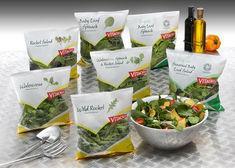
Scientists from the University of Southampton, in collaboration with Vitacress Salads, are undertaking a trial to assess the health benefits of eating bagged lettuce.
Previous studies involving other vegetables and fruit have shown a number of plant compounds to have properties that aid prevention of certain diseases. Less information is available for lettuce, while consumption of bagged salads has increased significantly in recent years, with Vitacress Salads often producing 1.5 million bags of salad for the UK market each week
By acting as antioxidants, plant compounds have shown, or been proposed to show, benefits in preventing certain forms of cancer, in reducing cholesterol levels, helping to prevent age-related eye diseases and in prevention of diabetes.
The purpose of the study is to determine how the ingestion of ‘fresh from the field’ and ‘supermarket bagged’ baby lettuce leaves influence the levels of total antioxidants in human blood and how these nutrients decline in time. The project also aims to identify the nutrients found in plants - individual antioxidant phytonutrients - which compose the total antioxidant content absorbed by humans, pinpointing which plant chemicals are important.
Volunteers will take part in one of two blind trials, in which they will be given fresh or bagged baby lettuce leaves of the green cos variety for breakfast. Blood samples will then be taken over several hours and analysed at the University of Southampton’s School of Biological Sciences, to assess the impact of lettuce eating.
Dr Graham Clarkson from Vitacress said: “We at Vitacress are passionate about the health-giving properties of our salads, from watercress and wild rocket down to the not-so-humble lettuce. We are particularly keen to see proof that eating our freshly prepared and bagged leaves is just as good as cutting them from your own garden.”